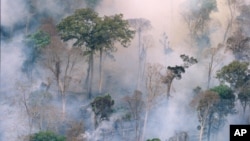Cambodian environmentalists say they will appeal to developed countries to ensure a carbon credit market, in the global effort to curb global warming.
Cambodia, which retains some of its forest cover despite rampant illegal logging, could use carbon credits as a way to trade in on living forests, which act as a sink for carbon in the atmosphere.
As world leaders prepare for a major round of climate talks in Paris in December, Tek Vannara, head of the NGO Forum, said carbon credits can work. But their markets need to be developed. “If carbon credits have no market, it contributes to deforestation.”
Sao Sopheap, a spokesman for the Ministry of Environment, said the government supports the idea of a carbon credit market. If NGOs raise the idea at the upcoming climate talks in Paris, “the idea is parallel with the government,” he said. “We should make sure that we have markets for carbon credits, so that we can benefit from the market to protect and preserve natural resources in developing countries, such as Cambodia.”
Cambodia has canceled seven out of eight carbon credit projects in the country, between 2011 and 2013.
Srun Darith, deputy cabinet chief for the Environment Ministry, said that those projects were only proposals with no clear plans. Cambodia has little knowledge on how carbon credit markets work, even though they could be good for the country, he said.
Cambodia is still monitoring the eighth project over the next six months, he said.
Cambodia has meanwhile lost major portions of its forest cover, losing a potential carbon sink to mitigate climate change, said Sao Sopheap. And while Cambodia is not a major producer of greenhouse gas, it should receive support from those developed countries that are, he said.







